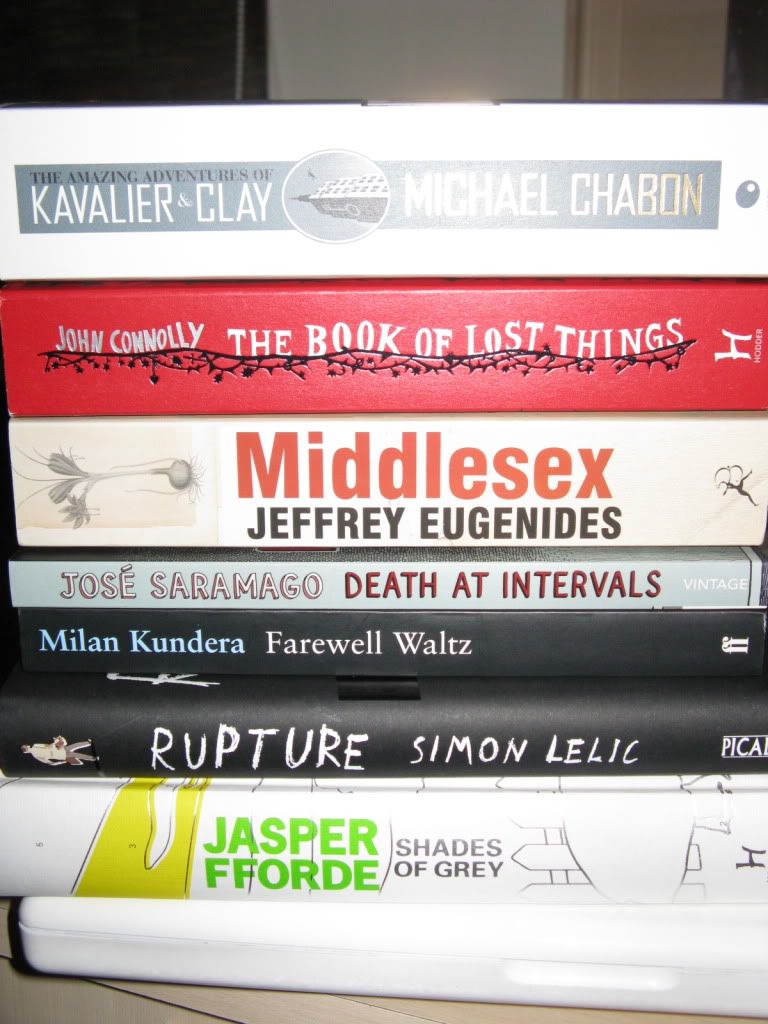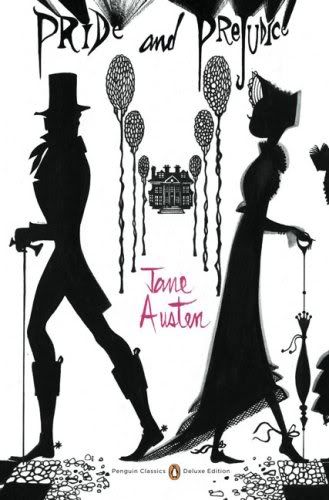 Mee invited all Pride and Prejudice first-timers to a readalong in February. I'd like to start this post by apologising for not finishing the book in the second month of the year itself, but, I got sidetracked with a couple of other things, and well, you know how it goes...
Pride and Prejudice is my very first Austen (yes, I'm a book blogger who has never read an Austen. Shame on me!), and there are so many things I want to say about the experience. I'm not going to write a proper "review" with a story recap etc. as, well, most people have a general idea as to what the story's about, and in my opinion, knowing more can ruin the story for them.
Mee invited all Pride and Prejudice first-timers to a readalong in February. I'd like to start this post by apologising for not finishing the book in the second month of the year itself, but, I got sidetracked with a couple of other things, and well, you know how it goes...
Pride and Prejudice is my very first Austen (yes, I'm a book blogger who has never read an Austen. Shame on me!), and there are so many things I want to say about the experience. I'm not going to write a proper "review" with a story recap etc. as, well, most people have a general idea as to what the story's about, and in my opinion, knowing more can ruin the story for them.
That was my major gripe with Pride and Prejudice. I really wish I'd read it as a teenager, as I wasn't aware of the storyline back then. Things have changed since, and much to my displeasure, I discovered that a lot of the feel-goodness of the book was lost as I already knew how things would come together in the end. Further, I also knew how a couple of characters would turn out, which was annoying.
That said, I did still enjoy the book, if for nothing else, the language - oh, how I loved the language! Why don't we speak like that now-a-days? Well-articulated, romantic sentences in proper English (it was the nineteenth century), with appropriate exaggerations? It's a fantastic world to get lost into, and the emphasis is so much more on the dialogue than the ambience. Through the dialogue, you acquaint yourself with the characters, and it's almost as though you're right there with them through everything: the balls and the walks, the ecstasy and the misery, the anger and the lament. You even get to read the letters between the characters, which tells you all the more about them, and by the end of the book, everyone has a favourite: Elizabeth Bennet or Mr. Darcy. Unfortunately, none of the other characters jump off the pages as much as the aforementioned.
Yet, I cannot fault Austen for characterisation. As readers, we're introduced to a myriad of characters who stem from being naively good hearted to downright self-involved and manipulative; from being "airheads" (sorry, but that is the apt twenty-first century term) to being gallant; from being weak-minded or avaricious to having severe delusions of grandeur thanks to association. The people would fit in today's society easily - we see them every day! Some we would judge, and some we'd want for our best friend. Some we'd loathe, and some we'd do our best to bring down to earth. Some we'd instantly have an opinion on, only to be proven wrong. That aspect of timelessness amazes me - are society's virtues and vices inherently still the same across two centuries?
And then, we come to the setting: Austen brilliantly brings out life in the nineteenth century, almost satirically. Imagine a world where girls aren't allowed inheritance, despite the property being owned by their father? How about a world where an embarrassing mother is trying to find an eligible bachelor for five teenage daughters (who really should be in school)? Or, a world where people who earn five thousand pounds annually are considered rich? Where girls are looking out for eligible "Officers" as potential husbands - everyone really has only one thing on their minds?! Some of the essential laws of human survival exist: power rules, money talks, estates wow and some people are better as indifferent acquaintances instead of friends!
I did like the dynamics between the characters as well, specially the Bennet family (including the aunts and uncles). Also, must make a special mention of the relationships between Mr. Darcy and his sister, and Mr. Darcy and his aunt Catherine, for they made the book a lot more rich!
I really did enjoy the book, although, maybe not the story in itself, if that makes sense? Again, I attribute that to me already knowing the way the plot would turn, and hence, missing out on the feel-good factor. Also, some of the romanticism and mushiness was a little much for me, but, I guess that was part and parcel of the nineteenth century, and maybe, in another lifetime, I was Elizabeth Bennet. Well, a girl can dream. :)

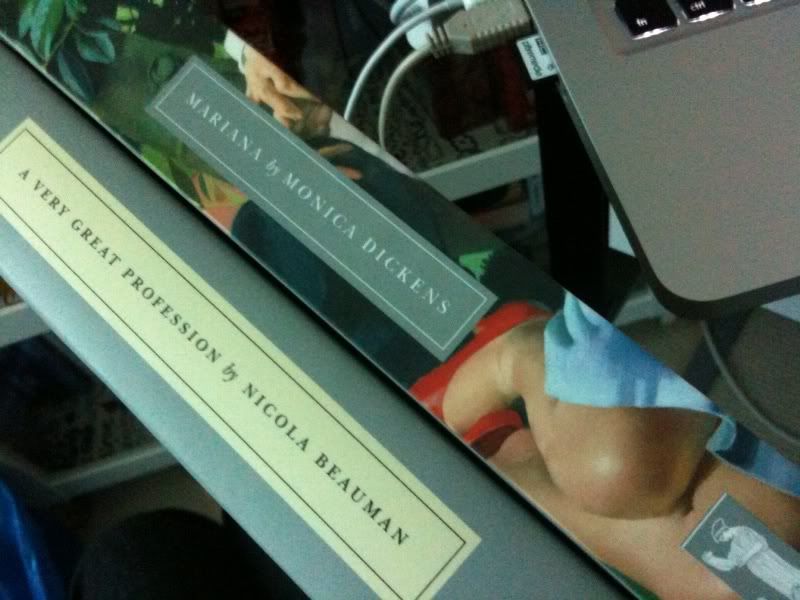
 Angela Carter's debut book, Shadow Dance, is the fifth book by her that I've read, and it's as bizarre as the previous three. Due to a million other things, I wasn't able to get my thoughts out on this sooner, which is a pity, as I wanted it to tie in with Claire's
Angela Carter's debut book, Shadow Dance, is the fifth book by her that I've read, and it's as bizarre as the previous three. Due to a million other things, I wasn't able to get my thoughts out on this sooner, which is a pity, as I wanted it to tie in with Claire's  Don't you love Terry Pratchett books? I do, despite never having read any in my teenage years, and Nation, a non-Discworld story, is no exception. Set in an alternate universe (or a parallel universe, if you like), this is the story of a young boy (Mau) whose homecoming has been ruined by a massive tidal wave, which has completely destroyed his village. There are no survivors, but him; and then he meets another survivor - from a shipwreck. Daphne, a posh British girl, with some royal blood, who doesn't speak the same language as Mau, nor is she accustomed to his kind of lifestyle.
As they try getting acquainted with one another, Pratchett exploits the humour surrounding language and cultural differences, keeping the reader thoroughly entertained; be it Daphne cooking for him, or him not realising what pointing a gun at him meant; be it the importance of trousers or the lack of clothes altogether.
Don't you love Terry Pratchett books? I do, despite never having read any in my teenage years, and Nation, a non-Discworld story, is no exception. Set in an alternate universe (or a parallel universe, if you like), this is the story of a young boy (Mau) whose homecoming has been ruined by a massive tidal wave, which has completely destroyed his village. There are no survivors, but him; and then he meets another survivor - from a shipwreck. Daphne, a posh British girl, with some royal blood, who doesn't speak the same language as Mau, nor is she accustomed to his kind of lifestyle.
As they try getting acquainted with one another, Pratchett exploits the humour surrounding language and cultural differences, keeping the reader thoroughly entertained; be it Daphne cooking for him, or him not realising what pointing a gun at him meant; be it the importance of trousers or the lack of clothes altogether.


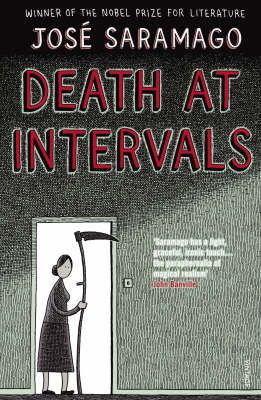 Death At Intervals (also published as Death With Interruptions) is an extremely surreal book by the Nobel Laureate, José Saramago. In a country (not necessarily futuristic), people have stopped dying one new year's day, in spite of illness, accidents and life in general.
The different strata of society react differently: people are initially joyous as they contemplate immortality; the religious people and the philosophers try debating it out - without death, what is the point of religion - and, the politicians, who try and figure out the socio-economic repercussions.
Death At Intervals (also published as Death With Interruptions) is an extremely surreal book by the Nobel Laureate, José Saramago. In a country (not necessarily futuristic), people have stopped dying one new year's day, in spite of illness, accidents and life in general.
The different strata of society react differently: people are initially joyous as they contemplate immortality; the religious people and the philosophers try debating it out - without death, what is the point of religion - and, the politicians, who try and figure out the socio-economic repercussions. I was born twice: first as a baby girl, on a remarkably smogless Detroit day in January of 1960; and then again as a teenage boy, in an emergency room near Petoskey, Michigan, in August of 1974.
So opens Eugenides' epic novel, Middlesex. Calliope "Cal" Stephanides was declared a girl when she came into this world, against the odds. Her grandmother's spoon (which had successfully predicted the sex of previous unborn children) had swung indicating a son would be born, but, Calliope's father begged to differ saying, "it's science" - well, maybe so, but, fourteen years later (despite being raised as a girl), the Stephanides family learnt that "Cal" had a 5-alpha reductase deficiency, which resulted in the doctor figuring a girl had been born, not a boy.
I was born twice: first as a baby girl, on a remarkably smogless Detroit day in January of 1960; and then again as a teenage boy, in an emergency room near Petoskey, Michigan, in August of 1974.
So opens Eugenides' epic novel, Middlesex. Calliope "Cal" Stephanides was declared a girl when she came into this world, against the odds. Her grandmother's spoon (which had successfully predicted the sex of previous unborn children) had swung indicating a son would be born, but, Calliope's father begged to differ saying, "it's science" - well, maybe so, but, fourteen years later (despite being raised as a girl), the Stephanides family learnt that "Cal" had a 5-alpha reductase deficiency, which resulted in the doctor figuring a girl had been born, not a boy.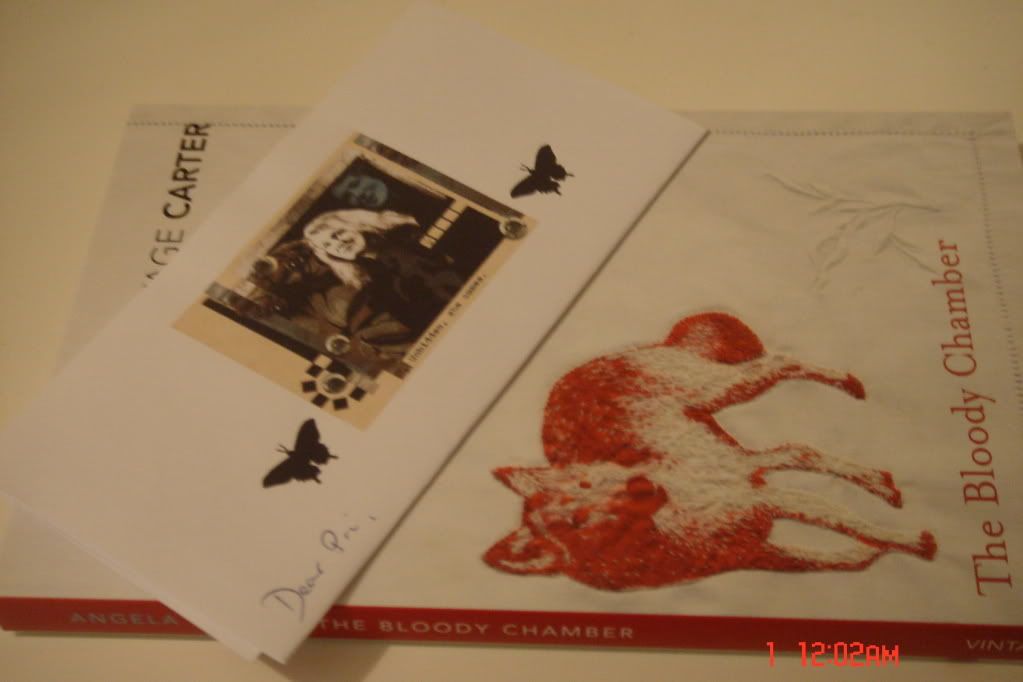
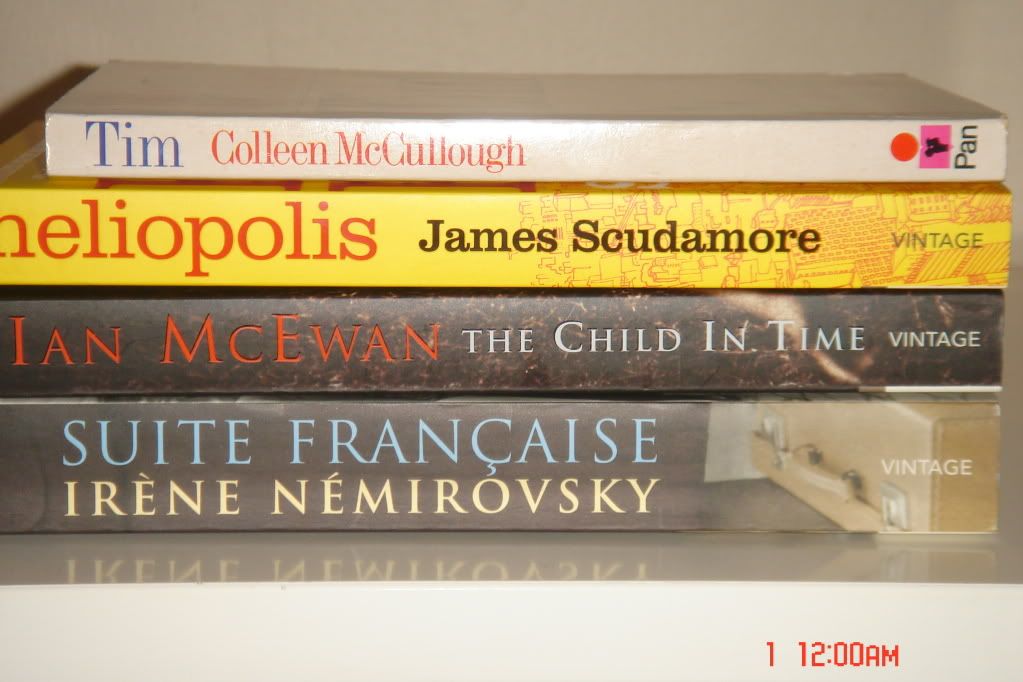
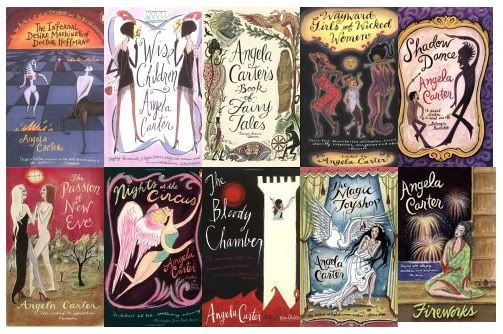
 We live in a world of the Columbine High School shootings, the Red Lake High School shootings and the Virginia Tech shootings. Something pushes people to pull the trigger on innocent people, and hard as we may try, the horror that ensues just cannot be justified. In Simon Lelic's debut novel, Rupture, the shooter, Mr. Samuel Szajkowski, was a teacher at a London public school. At assembly one morning, he shot three students and one teacher, before turning the gun on himself.
The novel reads as a fast paced mystery novel, despite the perpetrator of the crime already being dead. Inspector Lucia May is in charge of what seems to be a fairly straightforward case, and her superior wants a to-the-point report, which will close the case for good. However, Lucia starts looking into the "why" of things, as opposed to immediately closing the case as her boss wanted her to, which annoys him to no end.
We live in a world of the Columbine High School shootings, the Red Lake High School shootings and the Virginia Tech shootings. Something pushes people to pull the trigger on innocent people, and hard as we may try, the horror that ensues just cannot be justified. In Simon Lelic's debut novel, Rupture, the shooter, Mr. Samuel Szajkowski, was a teacher at a London public school. At assembly one morning, he shot three students and one teacher, before turning the gun on himself.
The novel reads as a fast paced mystery novel, despite the perpetrator of the crime already being dead. Inspector Lucia May is in charge of what seems to be a fairly straightforward case, and her superior wants a to-the-point report, which will close the case for good. However, Lucia starts looking into the "why" of things, as opposed to immediately closing the case as her boss wanted her to, which annoys him to no end. Mee
Mee 